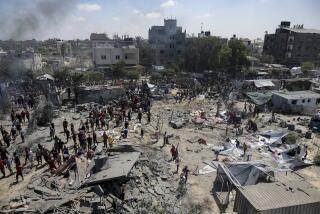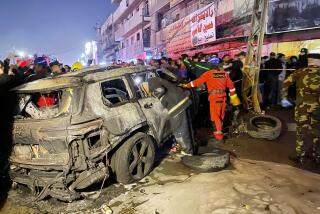Suicide bomber kills an Iraqi police chief
- Share via
BAGHDAD — A suicide bomber posing as a policeman killed the police chief of northern Iraq’s Nineveh province Thursday as he visited the site of an attack a day earlier.
The brazen assassination, which occurred in the presence of Iraqi and U.S. troops, underscored the challenges confronting the American military as it struggles to sustain security gains made in the last year.
Those issues include the increased use of suicide vests as killing devices; the rise in attacks in the north as insurgents shift operations to evade U.S.-led offensives; and the targeting of high-ranking Iraqi security officials, whom the Americans need to lead the fledgling police and military as U.S. troops decrease their presence in the country this year.
The police commander, Brig. Gen. Salih Mohammed Hassan, was the third provincial police chief slain since August and the second in less than two months. Two police officers, including his bodyguard, died alongside him. A U.S. and an Iraqi soldier were among the wounded.
A spokesman for the provincial police, Brig. Gen. Khalil Jabouri, wept as he confirmed Hassan’s death in a telephone interview.
“They killed our new police chief. He only received his post a month ago,” he said. The former chief took a job as an advisor to the nation’s interior minister.
Recent U.S. military statistics indicate that though Iraqi civilian and U.S. troop deaths have declined steadily since June, deaths among Iraqi security forces have increased slightly since November.
The data also show that the number of attacks by bombers wearing explosives vests or belts has increased since October as other forms of attack, notably car and truck bombs, have decreased. The military has attributed this in part to the U.S.-led security plan, which has forced insurgents to switch tactics. The crackdown brought an additional 28,500 American troops to Iraq last year and introduced checkpoints that hamper the movement of vehicles carrying explosives.
The security plan, which concentrated on Baghdad and the western province of Anbar, has pushed insurgents north. The U.S. military says one result has been a slight upward trend in violence in Nineveh, whose capital, Mosul, is considered a prize for the insurgent group Al Qaeda in Iraq.
At a news briefing this month, the commander of U.S. forces in northern Iraq, Army Maj. Gen. Mark P. Hertling, compared Mosul to Gettysburg because of its strategic location. The city, Iraq’s third-largest, sits on the Tigris River and is linked to Syria by a major road, which U.S. officials say is a common route for foreign fighters entering Iraq. Other roads passing through Mosul permit easy access to Iran to the east, Turkey to the north and Baghdad to the south.
Mosul also is an ethnic melting pot with a population of about 1.7 million.
“So people can hide there,” Hertling said. “It has always been an important city to Al Qaeda.”
Nineveh is one of four northern provinces being targeted in a major U.S. and Iraqi military offensive that began Jan. 8.
The attack Thursday capped a horrific 24-hour period for Mosul.
A three-story apartment building rigged with explosives blew up Wednesday afternoon as Iraqi soldiers searched an adjacent structure for a weapons cache.
Hisham Hamdani, a provincial official, said the death toll from the building blast had reached 34, more than twice the number initially reported. There had been fears that the casualty toll would rise dramatically as rescue workers, who included U.S. troops, dug through the rubble of the wrecked building and several others nearby that suffered damage.
Hamdani said that 224 people were injured in the blast, which apparently was timed to go off after soldiers arrived in the area. The explosion left a massive crater where the apartment building had stood. The surrounding neighborhood resembled an earthquake zone, with piles of rubble from collapsed or damaged buildings.
As the police chief and Iraqi and U.S. forces visited the site Thursday morning, a bomber dressed in an Iraqi police uniform mixed in with the crowd.
An injured witness, who spoke from a Mosul hospital but did not want to be identified, said the blast occurred minutes after Hassan’s arrival.
“I found myself flying, and then thrown on the ground,” he said.
The attack brought condemnations from Iraqi leaders. Prime Minister Nouri Maliki called it “an abomination.”
“The crime reveals how broken and low the terrorists are after the defeats they have suffered,” Maliki said in a statement.
A statement from the Iraqi Accordance Front, or Tawafiq, the main Sunni Arab bloc in the parliament, described the bombing of the building and the subsequent attack as “genocide.” It demanded better security in the province and aid to those affected by the latest violence.
Last month, another provincial police chief, Maj. Gen. Qais Hamza Mamouri, was assassinated in Hillah, the capital of Babil province south of Baghdad. In August, the acting police chief of the southern province of Qadisiya, Maj. Gen. Khalid Hassan, was killed, along with the provincial governor.
The U.S. military statement blamed Al Qaeda in Iraq for the Mosul attacks, but there was no claim of responsibility by the group.
--
Special correspondent Ruaa al-Zarary in Mosul contributed to this report.
More to Read
Sign up for Essential California
The most important California stories and recommendations in your inbox every morning.
You may occasionally receive promotional content from the Los Angeles Times.














